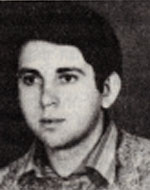Dov (Bar), son of Rachel and Zevulun, was born on July 21, 1947 in Germany to his parents who were Holocaust survivors, and in 1948 immigrated to Israel and settled in Rishon Letzion. The parents, whom the war and camps were deeply hurt by body and soul, were unable to finance the boy’s continued studies, and he went to work to help his parents and pay for his high school studies in the evening, and his parents had deep love and loyalty. Encouraging Dov to express his thoughts in writing poetry and his sensitive soul was able to create a deep and heartfelt connection with children who loved him with great love. To the IDF in early August 1965 and was assigned to the Armored Corps. After finishing basic training at the Armored Corps School of Patton, he participated for several months in the Armored Corps choir and was later sent to the tank commanders course. After finishing, he was sent to a field unit. He was a good tank commander and an excellent armor man. As a man, he had a sensitive soul, a kind heart, and a friend in heart and soul. Though he knew how to conceal his beautiful qualities behind the mask of apparent indifference, his real friends learned to appreciate his nature and to love his dear friend and trusted friend. They knew that he could always be trusted, at any moment and in any situation. During the Six-Day War, Dov served in the southern front and fought bravely in the Sinai battles. In early August 1968, Dov completed compulsory service and was assigned to a reserve unit. After he was released, he wanted to realize his desire to continue his studies at the Technion. He was accepted to the Technion preparatory group, but later moved to Be’er Sheva, where he was accepted to work at the Nuclear Research Center. In 1970, Dov married his girlfriend, Irit, and with her encouragement began to think again about continuing his studies. Indeed, in 1972, after the birth of his daughter Meirav, and in joint efforts of himself and his wife, he was accepted to the Negev University, to the Department of Geology. Dov was loved by his classmates and lecturers and excelled in his diligence and in his attitude toward studies. He was a devoted husband and an exemplary father who had a great deal of warmth over his little daughter, who served as a source of satisfaction and satisfaction after his busy day of study and study. His man was calm and quiet, who never raised his voice, and was able to deal with problems with logic and judgment. When the Yom Kippur War broke out Dov was sent with his unit to Sinai. On the 12th of Tishrei 5734 (October 8, 1973) during his battalion’s assault on the Firdan Bridge, his tank arrived at a distance of two hundred and fifty meters from the water line, south of the “Haviva” axis, and the trail was lost. Dov was declared missing and for many months his family lived in the hope that he was taken prisoner and that he would return. But later on his body was found and it was clear that on that day, Dov was killed in the attack. He was laid to rest in the cemetery in Rishon Letzion. He left behind a wife and daughter, parents and brother. After his fall, he was promoted to First Sergeant. In a letter of condolence to the grieving family, his commander wrote: “Your son, Sgt. Dov Salzstein, fell in battle during the Yom Kippur War, east of the Suez Canal, near the Firdan Bridge. Dov, who served as a tank crew in an armored unit under my command, was loved by his commanders and his colleagues and fulfilled his duty impeccably.”
